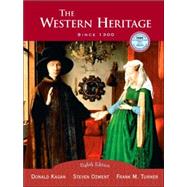
| www.prenhall.com/kagan Prentice Hall's exclusive Companion WebsiteTrademark that accompanies The Western Heritage, Seventh Edition, offers unique tools and support that make it easy for students and instructors to integrate this online guide with the text | |
| The site is a comprehensive resource that is organized according to the chapters within the text and features a variety of learning and teaching modules | |
| For Students: Study Guide Modules contain multiple choice and true/false quizzes, map exercises, and other features designed to help students with self-study | |
| Reference Modules contain Web Destinations and Net Search options that provide the opportunity to quickly reach information on the Web that relates to the content in the text | |
| Communication Modules include tools such as Live Chat and Message Boards to facilitate online collaboration and communication | |
| Personalization Modules include our enhanced Help feature that contains a text page for browsers and plug-ins | |
| For Instructors: The Syllabus ManagerTrademark tool provides an easy-to-follow process for creating, posting, and revising a syllabus online that is accessible from any point within the Companion WebsiteTrademark | |
| A Faculty Module give faculty the ability to download art from the book for creating PowerpointTrademark slides in addition to lecture notes and strategies for teaching Western Civilization | |
| The Companion WebsiteTrademark makes integrating the Internet into your course exciting and easy | |
| Join us online at the address above and enter a new world of teaching and learning | |
| Table of Contents provided by Publisher. All Rights Reserved. |
The New copy of this book will include any supplemental materials advertised. Please check the title of the book to determine if it should include any access cards, study guides, lab manuals, CDs, etc.
The Used, Rental and eBook copies of this book are not guaranteed to include any supplemental materials. Typically, only the book itself is included. This is true even if the title states it includes any access cards, study guides, lab manuals, CDs, etc.